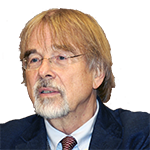Gunnar Heinsohn

* Gdynia, 1943 † Gdansk, 2023
Lived in: Bremen, Germany
Sociologist
Dr. Heinsohn studied Philosophie, Economy and Sociology in Berlin, and obtained his PhD in Sociology 1974. In 1982 he took also a PhD degree in Economics. Since 1984 he was professor at the University Bremen (Germany). He is one of the first German critics of chronology and in 1982 he was, together with Christoph Marx, Ch. Blöss and H. Illig, one of the founders of the Society for the Reconstruction of the History of Humankind and Nature (GRMNG). His first book about history and chronology was called The Sumerians never existed ( 1988). Based on stratigraphical facts, Heinsohn was able to show that the conventional history of Mesopotamia and Egypt has been stretched over 2000 years, added to real history due to ther first archeologists accepting the Bible’s dates for Abraham as basis for dating their excavations.Heinsohn has published also books about the history of Egypt, about the Middle Ages, the persecution of witches, the history of religion and the development of money. Heinsohn was a frequent contributor to several German newspapers about sociological subjects, like immigration, and wrote also for the French daily Le Monde and the American papers The New York Times and The Wall Street Journal. He died on 16th Februar 2023 in Gdansk (Poland).
Books and Essays
- 1984: Privateigentum, Patriarchat, Geldwirtschaft, sozialtheoretische Rekonstruktion zur Antike. Suhrkamp.
- 1985: Die Vernichtung der weisen Frauen. Beiträge zur Theorie und Geschichte von Bevölkerung und Kindheit. März, Herbstein (together with Otto Steiger).
- 1988: Was ist Antisemitismus? Der Ursprung von Monotheismus und Judenhaß. Eichborn.
- 1988: Die Sumerer gab es nicht. Von den Phantom-Imperien der Lehrbücher zur wirklichen Epochenabfolge in der „Zivilisationswiege“ Südmesopotamien. Eichborn.
- 1990: Wann lebten die Pharaonen? Archäologische und technologische Grundlagen für eine Neuschreibung der Geschichte Ägyptens und der übrigen Welt. Eichborn, (together with Heribert Illig).
- 1991: Wie alt ist das Menschengeschlecht? Stratigraphische Grundlegung der Paläoanthropologie und der Vorzeit. Mantis, Gräfelfing.
- 1993: Wer herrschte im Industal? Die wiedergefundenen Imperien der Meder und Perser. Mantis, Gräfelfing.
- 1995: Warum Auschwitz? Hitlers Plan und die Ratlosigkeit der Nachwelt. Rowohlt.
- 1996: Eigentum, Zins und Geld. Ungelöste Rätsel der Wirtschaftswissenschaft. Rowohlt.
- 1997: Die Erschaffung der Götter. Das Opfer als Ursprung der Religion. Rowohlt.
- 1998: Lexikon der Völkermorde. Rowohlt.
- 2003: Söhne und Weltmacht. Terror im Aufstieg und Fall der Nationen. Orell Füssli, Zurich.